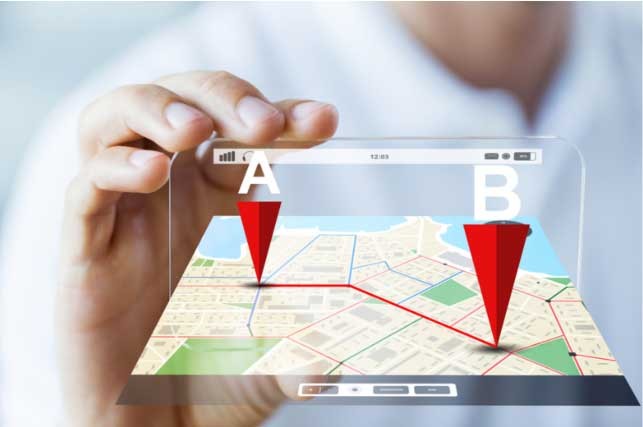Bluetooth trackers appeared a few years ago, after Bluetooth technology incorporated low energy mode, allowing a simple Bluetooth-enabled device to work for a long time while being equipped with a small battery. With Bluetooth low energy mode, a standard Bluetooth tracker can work for about a year before its battery dies. This means that you can pick up a cheap Bluetooth tracker and use it for more than a year before needing a replacement.
Since Bluetooth-enabled trackers are very affordable, and they promise that, with them, you’ll never lose your stuff again, they have become quite popular. But the fact is they just can’t replace standard GPS trackers, especially if you want to secure valuable items like your travel bag or an expensive DSLR camera - or even loved ones. Now, why they are inferior to GPS trackers, and what can they do exactly?
Explaining Bluetooth Trackers
Bluetooth trackers support Bluetooth connection allowing you to pair one with your mobile device and track it. They can be hooked or plugged to an item and then used to track it. Since Bluetooth connection is very limited these trackers can only be used for tracking objects at a short distance.
They usually look like small tags and can be connected, slotted in, or hooked to a certain object (a keychain, or a bag). They work by keeping the connection with your phone, so you can locate the lost item. Also, if you leave an item behind, the tracker will send a signal to your smartphone as soon as your phone leaves Bluetooth connection range, making them great as reminders so you cannot forget about taking your keys, headphones, or a similar everyday item you use.
Once the tracker leaves the range of your Bluetooth connection, the mobile app will only show you the most recent location of the item, before it left Bluetooth range. Because of this, Bluetooth trackers cannot replace classic GPS trackers because they have an immensely higher range and can work as long as they have access to a cellular network and GPS connection. Let’s talk more about differences between Bluetooth and GPS trackers.
Differences between Bluetooth and GPS Trackers
Let’s check out the main differences between the two tracker types. First off, GPS trackers are usually bigger, and they come with rechargeable batteries. Instead of relying on the Bluetooth connection they use GPS satellites in combination with a cellular signal in order to track different items. For instance, if you secure your bag with a GPS tracker, the device will be able to send its location to your smartphone as long as it has access to cellular signal and GPS satellites. So when you lose the bag, the tracker which you put inside the bag will show you its location and will regularly update it when the bag moves.
You will be able to track it in real time, and you will receive notifications showing the bag’s position. This way you are able to locate it even if the bag is miles and miles away from you. In the case your bag got lost in an airport you will be able to find it no matter what. Well, except if the airline company managed to send the bag to another flight, but you will still be able to locate the bag. Getting it is the hard part.

On the other hand, we have Bluetooth trackers. They are very small and can pair with your mobile device. Once you pair the two devices you can assign your Bluetooth tracker to some item (like your keys), clip, or tag it to the item, and name the tracker via your smartphone so you know which item is tracked with the device (for this example we will name the tracker as “keys”). Now, your keys are tracked with the Bluetooth tracker. Actually, the device is tracked with your mobile via tracker’s mobile app.
Now, when you misplace your keys they can be found by entering the app and selecting the right locator (“keys” in this case). If it is in range ( the Bluetooth tracker range is usually between 30-150 feet) it will show up on the map found in the app. You can also activate trackers’ alarm so you can locate your keys if they fell behind the sofa, or if you left them below a book, or something similar.
While Bluetooth trackers work great when they are in range, if you accidentally lose your keys while at your favorite coffee place, it won’t be possible to locate the keys if you go out of range of the tracker. So, if you forget to pick them up at the café, return home and realize you don’t have them, you won’t be able to locate them. The app will just show you the tracker is out of range, along with the last known position of the tracker. Great if you lose keys (something that isn’t so interesting to get picked up by someone). You can just return to the café (the last known position) to locate them once you arrive. But, if you lose a valuable item (like your laptop), a Bluetooth tracker might not be as efficient in finding the item.
As with the keys, it will show the last known position of the tracked item (laptop bag), but if someone takes your laptop you won’t be able to locate it again, except if the tracker is in range of your smartphone’s Bluetooth connection (and if someone decides to steal your laptop, chances are they will get as far away from the café as possible). As you can see, Bluetooth trackers are great for tracking everyday items you tend to misplace in your house, or at work, but they are a poor choice for securing valuable items that can end up being stolen.
If you want to track your drone, camera, laptop, bicycle or something else of high value or even more important like children, the elderly or pets GPS trackers are much better. They are bigger but offer a rechargeable battery, broad coverage across your region or even global as in the case of Turtler devices, much better tracking abilities, as well as some other nice features.
Both GPS and Bluetooth trackers can use an alarm function. It is simple – just activate the alarm in your mobile app and the tracker will start beeping notifying you where your lost belongings are. Also, some Bluetooth trackers can find your lost phone. For instance, if you wear one with your keys you can push its button and it will automatically ring your smartphone so you can locate it.
Some Bluetooth trackers support geofencing, a great way to always remember bringing certain items. Geofencing is a cool function that puts a virtual boundary around an object (in this case a Bluetooth tracker tied up to a keychain), informing the user as soon as the object (or the user) gets too far from the boundary. Since virtual boundary is defined by a Bluetooth frequency range, you will be notified once you leave your keys or a bag, or once the object wanders outside the boundary. This can help you secure an object, but you have to be in close proximity, unlike with GPS trackers.
Why Are GPS Trackers Superior to Bluetooth Trackers?
GPS trackers feature more options, and work with cellular networks and GPS satellites, giving them unmatched range. Some specialized trackers for outdoorsmen even connect via satellite networks and work beyond the populated-area-focused mobile networks. If you want to secure your valuables, GPS trackers are the way to go. Instead of being limited to just 150 feet (or less, in most cases), GPS trackers can track your stuff in real time, and notify you about any movement.
They also feature rechargeable batteries and can be used to track your loved ones. You can give your child a GPS tracker, and be relieved because it can send you regular updates notifying about the exact location of your youngster. Also, your child can send an SOS signal containing its exact location along with regular location updates so you can find it if it gets lost in the city or just if it wants for you to ride it home. In the case of the Turtler Shell device, your child can even receive a phone call from you to the device, or make a call direct to you going out.
In the case of the Turtler Shell device, your child can even receive a phone call from you to the device, or make a call direct to you going out.
All GPS locators work via mobile apps meaning that you can not only use standalone locators but can also transform your mobile device into one, allowing friends and family to track your movements while you are, for instance, on a trip abroad. You can’t use Bluetooth locators for any of the aforementioned scenarios.
Bluetooth trackers are okay to be used for tracking your keys, laptop, or something else you can easily forget about or misplace. They will let you know once you leave the virtual boundary so they are also nice for other stuff you carry around with you at all times. But, they aren’t the right solution for valuable belongings you want to live-track because of their highly limited range.
Conclusion
As you can see, Bluetooth trackers may look like a perfect solution for tracking your things, costing just a fraction of a price of a standard GPS tracker. But they cannot give you the security and real-time tracking capabilities of a GPS tracker.
They are great for tracking itmes that can get easily misplaced, but if you want to secure your valuables, or to use your phone as a GPS tracker, real GPS trackers connected to either the telecom networks or a satellite network are the way to go.





Share this article